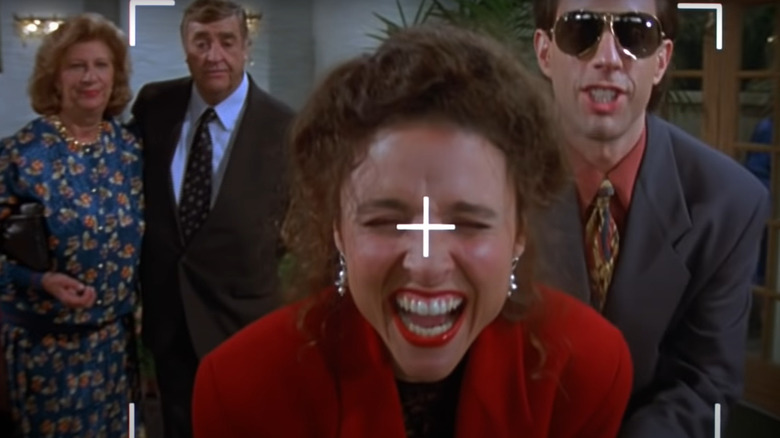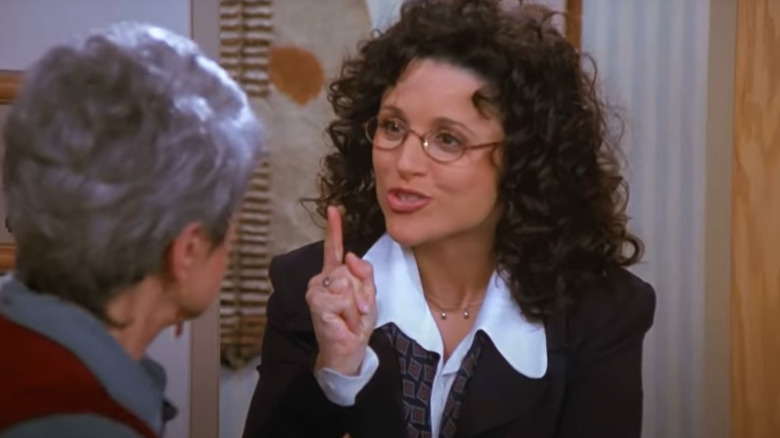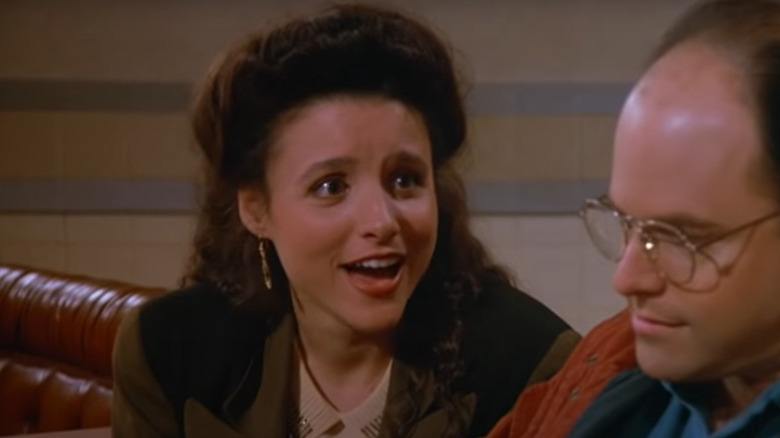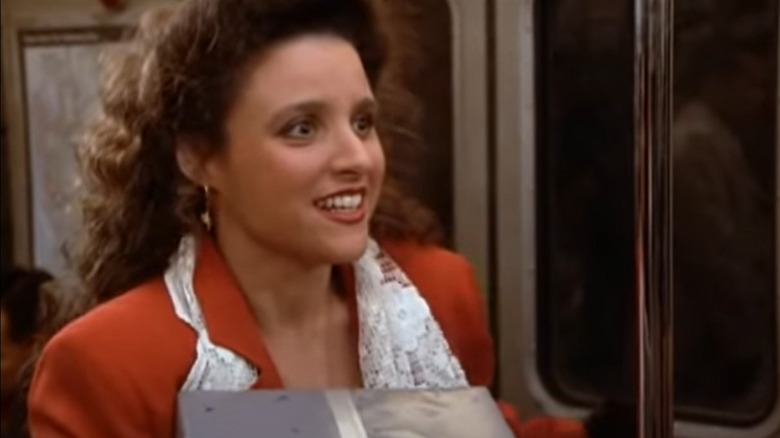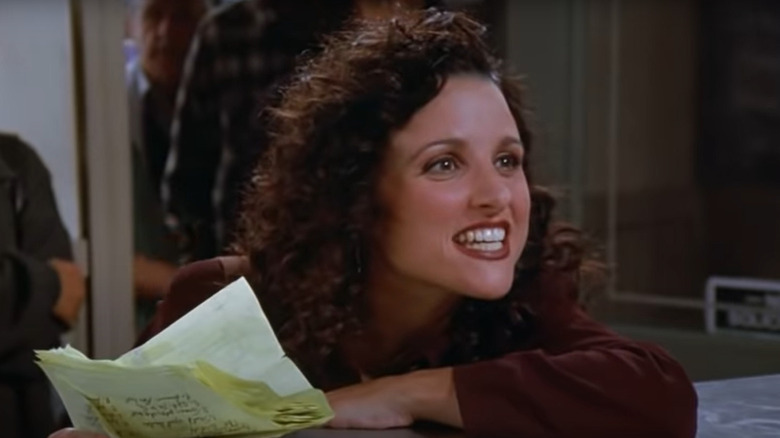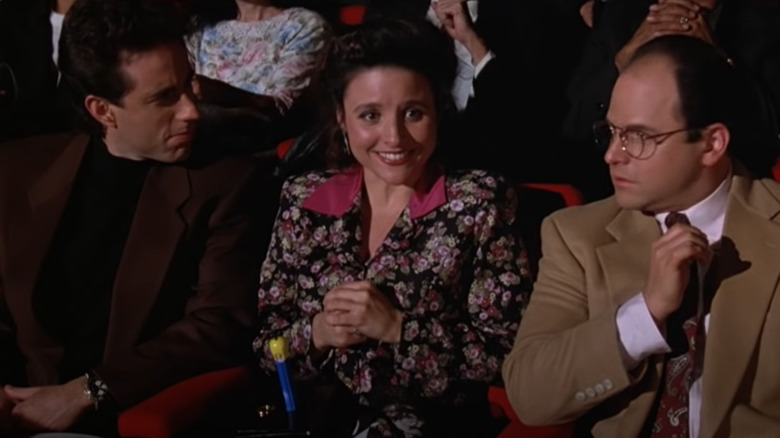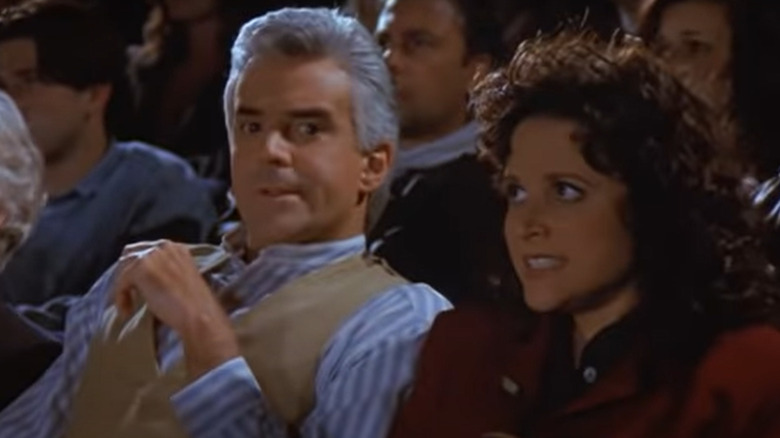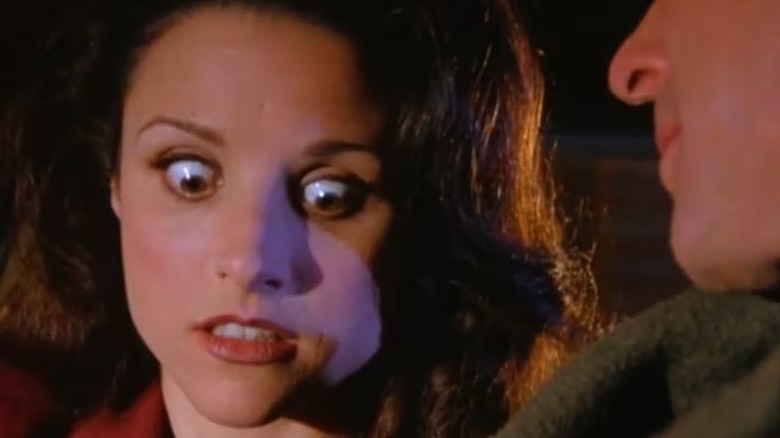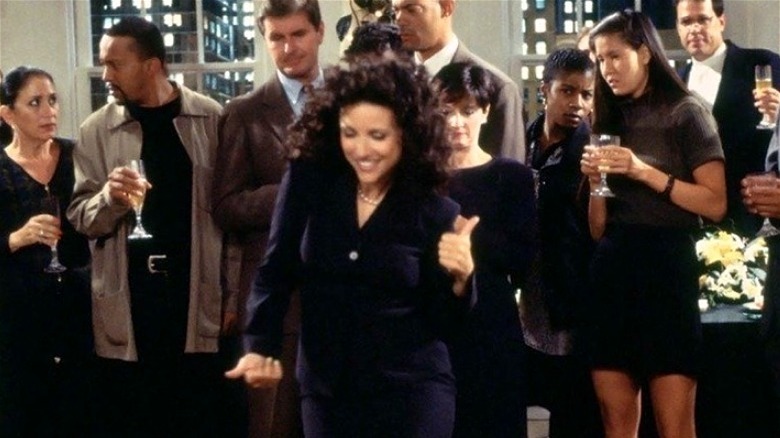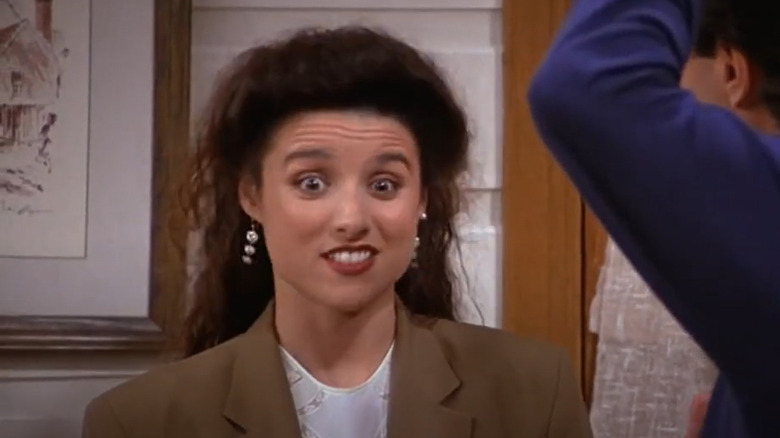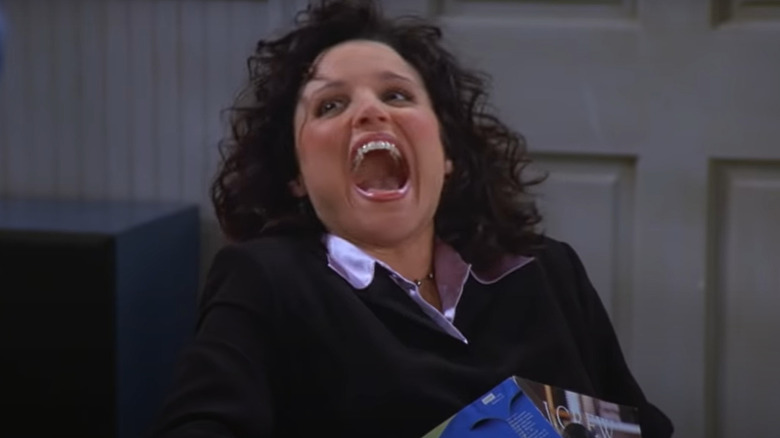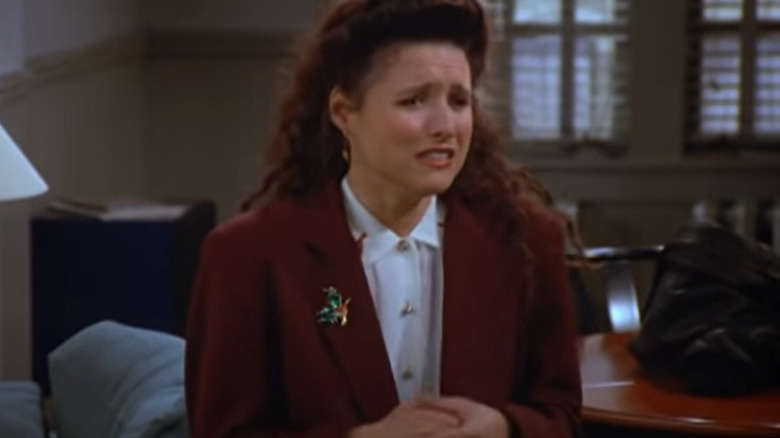Julia Louis-Dreyfus' Best Episodes Of Seinfeld
The quintessential NBC comedy "Seinfeld" follows friends Jerry, George, Elaine, and Kramer as they rudely navigate life in Manhattan. The characters are based on real people – Jerry (co-creator Jerry Seinfeld) is based on himself, George Costanza (Jason Alexander) is based on co-creator Larry David, and Cosmo Kramer (Michael Richards) is based on David's real-life neighbor Kenny Kramer. But who inspired the character of Elaine Benes?
"This person, Julia Louis-Dreyfus, who agreed to do this part with three stupid guys and used it to launch one of the most brilliant and spectacular show business careers of all time, this person is a 'network note," said Jerry Seinfeld when presenting Julie Louis-Dreyfus with the 21st Annual Mark Twain Prize for American Humor in 2018.
That's right — Elaine Benes almost didn't exist. After the pilot of "Seinfeld" aired, NBC doubted the show would succeed, and sent a firm note — add a female lead. Once Louis-Dreyfus was hired, the network agreed to a four-episode season.
Today, "Seinfeld" is unimaginable without the fusion of Elaine Benes' antics and Louis-Dreyfus' comedy. Elaine broke barriers for female characters on television through her hilariously brave and often miscalculated moves throughout nine seasons, fueled by Louis-Dreyfus' own dance moves, incredible ability to yell "Shut up!" and brazen one-of-the-guys attitude. Through her role as Elaine, Louis-Dreyfus blazed a vastly successful career for herself and other comedic women to follow.
Here's a curated list of Julia Louis-Dreyfus' best episodes of "Seinfeld." Warning: do not watch with a full bladder, as you may soil yourself with laughter.
The Pen (Season 3, Episode 3)
Relatable, quotable, and hilarious, "The Pen" is highly rated on IMDb and a fan favorite. Elaine and Jerry visit Jerry's parents in Florida. The stay turns sour when Elaine's back is hurt by sleeping on a pull-out sofa and she over-indulges in muscle relaxers. The full effect of the pills isn't clear until Elaine's behavior disrupts the Seinfeld family gathering — she laughs uncontrollably, and belligerently bellows "Stella!" repeatedly, causing a ruckus.
Meanwhile, a much less funny ruckus took place behind the scenes. Jason Alexander nearly quit "Seinfeld" because George isn't in this episode. Obviously, the writers made sure to always give George something to do from then on.
Fans love Elaine's embarrassing arc in "The Pen" because it hits home. The episode evokes a nightmarish adult scenario. If we haven't all necessarily lived it, we can easily envision finding ourselves once again at the mercy of parents at an inhospitable home environment, transforming from a decent person into a trainwreck looking for any relief, swinging too far, and reaching family photo album immortality as a sloppy outsider. Elaine's crash-and-burn in "The Pen" is shame-soothing schadenfreude.
The Susie (Season 8, Episode 15)
In "The Susie," Elaine finds out how far she'll go to avoid an awkward interaction. Spoiler: It's too far.
On one otherwise normal morning, Elaine's coworker Peggy calls Elaine "Susie." Before Elaine can correct her, Peggy dishes gossip on Elaine. Quick to defend her alter ego, Elaine takes on the identity of Susie. At one point, Elaine scolds Peggy for calling her "Suz." "It's Susie," Elaine hisses, fire in her eyes: "Susie."
Elaine's boss Peterman insists on mediating the growing tensions between Elaine, Susie, and Peggy in his office. Julia Louis-Dreyfus' performance during the mediation is truly hysterical, taking the "Mrs. Doubtfire" two-meetings-one-restaurant trope to a whole new level. Elaine's careful wording during the scene is fantastic writing, and includes verbal gymnastics like, "Look! We don't have to name names or point fingers or... name names."
Eventually, Elaine is forced to kill off Susie, leading to one of the most hilarious funeral scenes in television history. The unreleased footage is equally funny; in the blooper reels, no one could keep it together during filming, especially Louis-Dreyfus. Additionally, "The Susie" also contains one of the funniest gags in the show – George's answering machine song. "The Susie" is a delightful reminder that a white lie can take on a life, and a death, of its own.
The Contest (Season 4, Episode 11)
The Emmy Award-winning episode "The Contest" is considered one of the best "Seinfeld" storylines of the show's entire run.
The group decides to hold a contest to see who can go the longest without pleasuring themselves, leading to an iconic episode of high jinks while cleverly evading NBC's censorship. Julia Louis-Dreyfus delivers a groundbreaking performance as perhaps one of the first women to talk about that subject on TV. "The Contest" made national news for its risqué plotline. Regardless, the script masterfully avoids using any hot-button words (no pun intended) leading to hysterical dialogue.
In a 1997 interview with Entertainment Weekly, President of Castle Rock Television (the show's studio) Glenn Padnick said, "We were expecting pages and pages [of notes]...But literally the only comment from the censors was 'Please delete a few references to Snapple."'
The plot of "The Contest" was based on a real-life contest Larry David participated in. He told Esquire in 2017 that the contest lasted "two days. Maybe three. I just remember it didn't last very long. I was surprised at how quickly it ended." Just like George, David won the contest.
Watching Kramer, Jerry, and Elaine quickly get off the contest train is utterly hilarious. Funnier still is George's ability to last longer than everyone (although he reveals he cheated later in the show). Perhaps George wins, but in a larger sense, he loses — self-hatred, self-denial, and lying go hand in hand. For George, his lies are rarely an asset.
The Subway (Season 3, Episode 13)
"Seinfeld" rarely splits up its leads; however, "The Subway" does just that, following each character on solo subway adventures. Elaine's plotline is destructively funny; all she wants is to get to her friends' wedding on time. According to internet rumors, Elaine carries a present the entire episode to hide the fact that Julia Louis-Dreyfus was pregnant while shooting. While we're not certain of this specific fact, we can confirm that Louis-Dreyfus was pregnant a few times during the production of "Seinfeld," so it seems plausible.
Elaine's trip starts when she offends a homophobic woman and gets worse when the train stops suddenly, trapping its passengers. Elaine's claustrophobia and neuroses collide in a powder keg of panic, and for the rest of the episode her internal dialogue and facial expressions are pure dark comedy. Elaine initially copes by hating her fellow passengers — "These disgusting animals, these people should be in a cage," she thinks. Her facial expressions are priceless as she realizes: "We are in a cage." Elaine loses it, mentally screaming.
Then the lights go out. Elaine goes into full panic mode, about to scream when the train starts up again. She breathes a sigh of relief, only to be plunged into horror when the train screeches to another halt in darkness. By the end of the episode, Elaine is slumped on top of her present at the café, as she has missed the wedding.
"The Subway" is a reminder that sometimes, suffering is unavoidable, especially on public transportation.
The Soup Nazi (Season 7, Episode 6)
"The Soup Nazi" is one of the all-time most popular episodes of "Seinfeld." The episode features Julia Louis-Dreyfus' finest comedy as she goes through nearly all the stages of grief over soup. Not only does this episode feature Elaine at her most gleefully vindictive, it's the source of the classic quote "No soup for you," still used fondly and frequently to this day by "Seinfeld" fans responding in the negative.
Elaine is banned from the best soup restaurant in the city by a strict chef known as "The Soup Nazi." Elaine goes through denial, anger, bargaining, and depression, but she stops at acceptance, opting for meticulously crafted revenge instead. She ruthlessly takes down the chef once and for all; if she can't have the soup, no one can. She uses the chef's own words against him in her final blow: "No soup for you!" With that statement, Elaine declares no soup for anyone, ever again.
This episode is a bitter spin on "The Gift of The Magi" and a reminder that anger leads to fear, fear leads to destruction, and destruction leads to the dark side of a soupless existence. Some might say that quote comes from an unrelated '90s media property and doesn't belong in a "Seinfeld" article. To them we say, no soup for you.
The Pez Dispenser (Season 3, Episode 14)
There's an iconic moment in "The Pez Dispenser" that's impossible to watch straight-faced — the scene where Elaine can't stop laughing in a theater and eventually has to leave during George's girlfriend's piano concert. The cause of her laughing fit? Jerry placed a Tweety Bird Pez dispenser on her lap.
Julia Louis-Dreyfus' laughter in this scene perfectly demonstrates a phenomenon called "getting the church giggles" in which one is struck by an uncontrollable urge to laugh in an inappropriate situation. The term was coined by Kathy Griffin according to Urbandictionary.com and is deeply relatable to a population bombarded with unexpected stimuli. Louis-Dreyfus' infectious and genuinely impressive laughter throughout the scene covers all the stages of getting the church giggles. According to Jason Alexander, Elaine's reaction to the Pez dispenser in this episode single-handedly resurrected Pez from a decline in the 90s, and the company had a full rebound.
The English Patient (Season 8, Episode 17)
Elaine absolutely hates the film "The English Patient," which makes her life slightly more difficult. A series of events punishes Elaine for her opinion, decimating her relationships one after another — her friends turn on her, her boyfriend leaves her, the café waitress won't serve her, and she is briefly fired from her job at the J. Peterman Catalog.
Elaine's chemistry with her boss Peterman is one of the funniest ongoing gags in "Seinfeld." In this episode, Elaine can't bring herself to tell Peterman she hated the film, which backfires when she pretends she's never seen it and Peterman insists on bringing her to the theater immediately. This leads to a classic Elaine freak-out in the movie theater when she yells at the screen, "Just die already! Die!"
In a 2019 Today interview, actor John O'Hurley described his portrayal of J. Peterman: "Very simply, Peterman was a legend in his own mind. He was kind of the corporate Mr. Magoo." Elaine's impatience and cynicism make for a fabulous clash when it comes to very long, very boring films like "The English Patient."
In real life, "Seinfeld" drove The J. Peterman Company to bankruptcy. Surprisingly, this was not due to the ruthless parody of the company; rather, the company's increased demand and exposure led to a cash flow imbalance. The J. Peterman Company went bankrupt and was eventually sold to Paul Harris stores.
This episode is a warning — use tact when your opinion about a movie is outnumbered ... or else.
The Stand-In (Season 5, Episode 16)
In "The Stand-In," Jerry sets Elaine up with his friend Phil. The date goes well till Phil "takes it out" in the car unexpectedly. Her look of shock and subsequent wry deliveries of the line "He took it out" throughout the episode spotlight the unparalleled comedic timing of Julia Louis-Dreyfus. While this is undoubtedly a funny episode, the way the gang shrugs off a sexual assault in "The Stand-In" is seriously concerning, even if it's also a reflection of what was sadly a socially acceptable attitude of the era.
This is one of the best Elaine episodes, although it can be triggering. Her ability to laugh and joke captures a little-understood element of trauma — when a person feels safe to talk, cry, or laugh after a traumatic event, their chances of developing PTSD are lower.
The male characters' callous responses to Phil's behavior is arguably more traumatizing than the original incident. Jerry is disbelieving and puzzled, asking, "How can this be?" Kramer tries to rationalize, suggesting, "Maybe it just needed some air." George, worst of all, is inspired — "Wow," he says. "I spend so much time trying to get their clothes off, I never thought of taking mine off." Not cool, George. Not cool at all.
If you or anyone you know has been a victim of sexual assault, help is available. Visit the Rape, Abuse & Incest National Network website or contact RAINN's National Helpline at 1-800-656-HOPE (4673).
The Little Kicks (Season 8, Episode 4)
In "The Little Kicks," Elaine's dance moves are not as smooth as she thinks. This episode features Julia Louis-Dreyfus in possibly one of the best physical comedy scenes on the show.
We have Louis-Dreyfus and her family to thank for the dance. In a Vanity Fair interview from August of 2019, Louis-Dreyfus said she developed Elaine's signature dance herself, ran it by her mom, and their favorite moves made the episode.
Not everyone was confident about the moves. The show's producers and writers were afraid Elaine's dancing would ruin Julia Louis-Dreyfus' career, and Larry David didn't want to develop it. In fact, the show waited until Larry David left the show to finally give Louis-Dreyfus' little kicks a spotlight. The same year "The Little Kicks" aired, Louis-Dreyfus won her first Emmy for outstanding supporting actress in a comedy series for her role as Elaine Benes. Louis-Dreyfus was nominated and lost the four years prior and had "hugely low expectations," according to an interview with Vanity Fair in 2017.
"I had submitted an episode that haunts me to this day, which is 'The Little Kicks' — the episode where Elaine dances. I think people dug that humiliating display. Maybe the episode itself was what did it," Louis-Dreyfus said.
Louis-Dreyfus went on to have the most successful career of the "Seinfeld" cast, winning the most Emmys in the awards' history.
The Stranded (Season 3, Episode 10)
George, Jerry, and Elaine grapple with social dysfunction in "The Stranded." The episode contains one of the best Elaine lines of all time, plus the gang's general inability to interact with anyone but themselves sets the stage for one of the best bottle episodes in television history, on par with one of the best episodes of "The Office" – "The Dinner Party."
George drags Jerry and Elaine to a party in Long Island. No one wants to go, and soon, no one wants to stay. Upon arrival, George beelines for his crush Ava, leaving Elaine and Jerry to fend for themselves. They devise a signal in case they need saving — patting their heads. This leads to slapstick moments juxtaposed with deadpan dialogue as Jerry and Elaine desperately try to escape conversational black holes, patting their heads to no avail as they're sucked in by the inescapable gravity of social nicety.
George takes off with the car to get it on with Ava, stranding the others. Jerry and Elaine are increasingly tortured, held conversationally hostage by mind-numbing banter. Elaine's claustrophobia is delightful to see triggered by socializing; unlike "The Subway" (where she screams in her head) and "The English Patient" (where she screams out loud), she opts to say something completely out of left field.
A woman's pronunciation of "fiancée" pushes Elaine over the edge and she drops one of the most quotable lines from Elaine Benes, in an Australian accent, no less — "Maybe the dingo ate your baby."
Julia Louis-Dreyfus' smirk of satisfaction to finally repel unwanted conversation is one the funniest moments on the show.
The Yada Yada (Season 8, Episode 19)
"The Yada Yada" features one of the most quotable moments in "Seinfeld." George's girlfriend introduces the phrase "yada, yada, yada" into the group's vernacular. The phrase is used to sum up stories and gloss over inconsequential or inconvenient details, and it takes to the gang like wildfire. Elaine uses the phrase to spruce up disappointing dating stories, and Julia Louis-Dreyfus' delivery of the phrase in this episode is hilarious and perfectly outlines its many applications. As far as the story goes, Elaine messes up Beth Lukner's attempt to adopt a child, but her most memorable scene includes Louis-Dreyfus' razor-sharp delivery of the line, "No, I mentioned the bisque."
This episode introduced the phrase to real-world vernacular as well. All kinds of lingo and catchphrases from "Seinfeld" became iconic, influencing culture in a huge way. Incidentally, "The Yada Yada" is also one of Bryan Cranston's best "Seinfeld" episodes. Cranston's character Tim Whatley converts to Judaism, one thing leads to another, and before long Kramer is accusing Jerry of being an anti-dentite.
The Pick (Season 4, Episode 13)
"The Pick" is one of the most memorable Elaine-centric episodes of "Seinfeld." If the title doesn't jog your memory, one word will: nipple.
Elaine enlists Kramer to take photos for her holiday cards. Unbeknownst to her, the cards contain a fateful blunder — her exposed nipple. Elaine doesn't catch the nip slip until too late and cards are in the mail, leading to an episode of absolute hilarity as Elaine struggles to cope with the increased exposure the cards brought her. Kramer and Jerry say it's not a big deal; however, they're the only people who think so. Elaine spends the entire episode answering annoying, nip-related inquiries from her friends, coworkers, and family.
Julia Louis-Dreyfus shows off her range as Elaine is wonderfully horrified throughout the episode, fluctuating across a spectrum of desperate optimism, humiliation, and rage that's hilariously externalized on George when he complains about not receiving a card at just the wrong time. Despite the annoying slut-shaming from Elaine's boyfriend, Julia Louis-Dreyfus shines like crazy in this classic episode.

